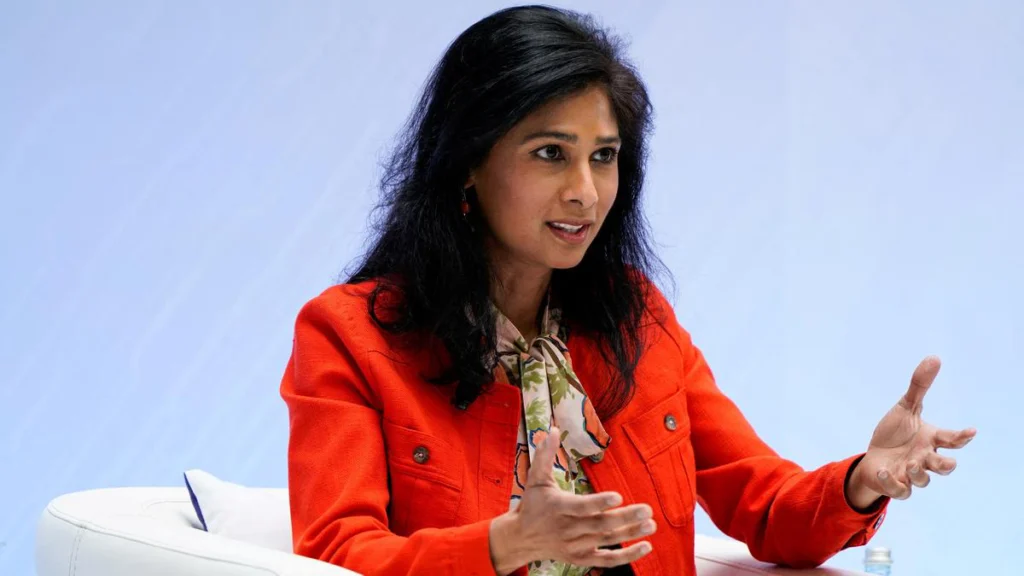Gita Gopinath leaving IMF in August to return to Harvard

Gita Gopinath, the first female Chief Economist of the IMF, is set to leave the institution in August 2025. She will return to Harvard University, where her career began. Gopinath joined the IMF in 2019, and her departure marks the end of a pivotal period in her career.
Her tenure at the IMF was marked by remarkable achievements. She guided the IMF through the global economic challenges of the COVID-19 pandemic and advocated for debt relief for struggling nations. Now, she is returning to academia, where she plans to continue her research and teaching.
Her Role at the IMF
When Gopinath joined the IMF as Chief Economist in 2019, she made history as the first woman to hold that position. During her time, she led the IMF’s research department, helping shape global economic policies. Her expertise in international finance, trade, and macroeconomics was invaluable in addressing the IMF’s most pressing concerns.
Her work on the global economic response to the pandemic was particularly significant. As the world faced an unprecedented health and economic crisis, Gopinath’s analysis and recommendations provided a clear roadmap for governments and international organizations. She advocated for strong fiscal stimulus measures and promoted global cooperation to combat the pandemic’s effects.
Gopinath’s Contributions to Global Economic Policy
In addition to her work on the pandemic, Gopinath tackled issues such as climate change, digital transformation, and income inequality. She expanded the IMF’s focus to include these emerging global challenges. Her research provided insights on how economies can adapt to these changes while maintaining growth and stability.
Her leadership also helped bridge the gap between developed and developing countries, emphasizing the need for inclusive growth and cooperation. Gopinath’s contributions have shaped the IMF’s approach to global economic challenges and have had a lasting impact on the way the institution addresses issues like trade imbalances, global debt, and climate risks.
A Transition Back to Harvard
Before joining the IMF, Gopinath was a professor at Harvard University. During her time there, she built a strong academic reputation, particularly in the fields of international finance and global trade. Returning to Harvard will allow her to continue her work in academia, where she will focus on researching the evolving global economic landscape.
At Harvard, Gopinath will also resume teaching and mentoring the next generation of economists. Her return to academia underscores her commitment to advancing economic research and developing new ideas to address the world’s most pressing issues.
Challenges at the IMF
Despite her successes, Gopinath faced significant challenges during her tenure at the IMF. One of the most challenging moments came during the pandemic, when she had to help lead the IMF’s response to the crisis. The scale of the pandemic’s impact on the global economy was unprecedented, and Gopinath’s leadership helped guide the IMF through this difficult period.
In addition, the growing political tensions between countries and the rise of protectionist policies made it harder for the IMF to coordinate international responses. Gopinath’s expertise in navigating these complex geopolitical challenges helped the IMF remain a central player in global economic policy.
Looking Ahead: Gopinath’s Legacy
Gopinath leaves a legacy of intellectual rigor, global collaboration, and steadfast leadership. Her work at the IMF has set new standards for economic research and policy analysis. She played a crucial role in strengthening the IMF’s research department and expanding its focus on emerging global issues.
Her leadership and academic achievements have inspired a new generation of economists, particularly women, to pursue careers in global economics. Gopinath’s contributions will continue to shape the way policymakers and economists approach international economic challenges.
A New Chapter in Academia
At Harvard, Gopinath will continue her groundbreaking research on global economic trends. She will focus on the effects of digital transformation, climate change, and other emerging issues on global trade and finance. Harvard will benefit greatly from her expertise, and her return marks an important moment for the institution.
Gopinath will also continue to educate and mentor future economists, passing on her knowledge and experience to the next generation. Her role at Harvard will further solidify her position as one of the leading economists of her generation.
Conclusion: Gopinath’s Lasting Impact
Gita Gopinath’s departure from the IMF is a significant moment in the world of economics. Her tenure at the IMF was marked by groundbreaking work on global economic policy and international cooperation. Her contributions to addressing the challenges of the pandemic and her efforts to shape the IMF’s research agenda will be remembered for years to come.
As Gopinath returns to Harvard, her legacy will continue to influence the world of economics. Her academic work, leadership, and advocacy for global cooperation will shape future discussions on economic policy and the challenges facing economies worldwide.






